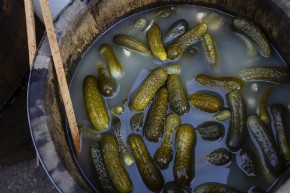Pickles: A history

I’ve long had it in mind to write a book with the title Pickles: A History. My husband thinks it’s a crazy idea, but there is precedent in the recent spate of social microhistories—big books about small things—which has given us books like Salt: A World History, The Pencil: A History of Design and Circumstance, The Box: How the Shipping Container Made the World Smaller and the World Economy Bigger, and Consider the Fork. Whimsical though it may seem, the impulse to tell the story of a civilization through a single object—a spice, a silkworm, a microbe, a pruning hook—can be a serious one. One can see the universe in a grain of salt.
G. K. Chesterton had a gift for microhistory: “Once I planned to write a book of poems entirely about the things in my pockets,” he tells us, “but I found it would be too long; and the age of the great epics is past.” In lieu of the epic poem the subject deserved, he contributed an essay to the Daily News on “What I Found in My Pocket.” And what he found in his pocket was a pocketknife, “one of the most primary of those practical origins upon which . . . all our human civilisation reposes”; a box of matches embodying “fire . . . the thing we all love, but dare not touch”; and a piece of chalk, in which he saw “all the art and all the frescoes of the world.” For Chesterton, the microhistory was a way to give thanks for existence itself.
But why pickles? It’s partly personal. I grew up on the border of the Lower East Side in the decades before its gentrification. New York was a little world for me then, a walkable microcosmos, from my neighborhood where everyone was Jewish though no one went to synagogue, to the multiethnic immigrant streets where Jewishness confronted me in forms at once exotic and connatural; and where the only Christians I was conscious of meeting were Catholic Workers at Dorothy Day’s St. Joseph House (they seemed pretty Jewish, too). My favorite walk took me to the Roumanian Pickle Works on Orchard Street. Uptown there were steaming chestnuts from street vendors at Christmas time; in my neighborhood there were candy buttons that stuck to the paper; but on the Lower East Side it was pickles all the way. Proust had his madeleines; I knew neither madeleines nor the Magdalen they bring to mind, but I had pickles, drawn from the depths of the giant barrels that crowded the sidewalk. No memory can compete for poignancy with one that has fermented in a great oak barrel.





